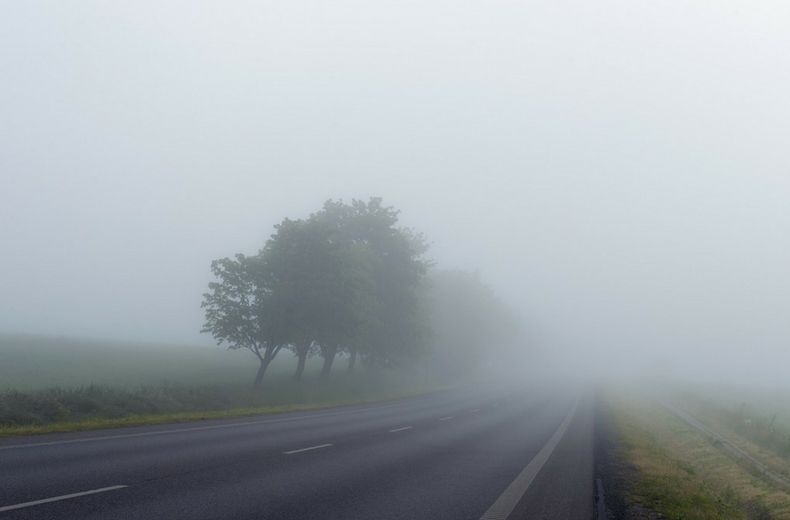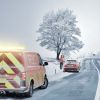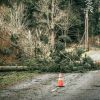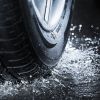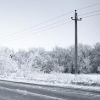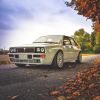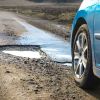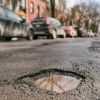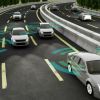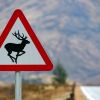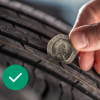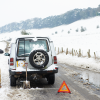Using them at the right time should aid safe winter driving but using fog lights at the wrong time could mean you are breaking the law and endangering other drivers.
To help you stay as safe as possible in wintery driving conditions, we have put together a guide of useful information on how to drive in fog and when to use your fog lights.
Top 5 tips for driving in fog
What does the fog light symbol look like?
![]()
These are the fog light symbols you're looking for if you want to switch them on.
They can usually be found on a button on the dashboard, on a steering wheel stalk, or next to the dial you use to control your regular lights.
Here's what your fog light switch might look like on a steering wheel stalk:
![]()
Front fog light
![]()
The symbol showing a lamp pointing to the left and with lines pointing diagonally down through the vertical wavy line is for your front fog lights.
Rear fog light
![]()
The symbol pointing in the opposite direction, with lines pointing horizontally straight through the wavy line is for your rear fog lights.
Take a look in your vehicle's logbook if you can't track them down or work out how to switch them on.
What to do when driving in fog
- Before entering fog, you should check your mirrors, then slow down
- Maintain a greater distance between you and the car in front, you could increase the gap to four seconds from the recommended two
- Make sure to use your wipers and to keep your windscreen demisted to aid visibility
- If the word ‘fog’ is shown on a signal, but the road is clear, be prepared for a sudden bank of fog or drifting, patchy fog
- Use your lights if visibility is reduced to 100 metres (328 feet) or roughly the length of a football pitch
- Make sure you know where your fog-light switch is before you set off
- Do not use full beam, because the fog reflects the light back, reducing visibility even further
- Do not attempt to navigate using the tail lights of the car in front, as these can give a false sense of security
- If visibility is very limited, wind down your windows at junctions and crossroads to allow you to listen out for approaching traffic
- If you really cannot see, you should consider stopping until it is safe to continue.
Did you know that mist and fog are actually very different things? There is also a worryingly-named phenomenon called freezing fog.

RAC sale – up to 33% off*
• Roadside cover from £5.29 a month†
• We get to most breakdowns in 60 mins or less
• Our patrols fix 4/5 breakdowns on the spot

When should I use my fog lights?
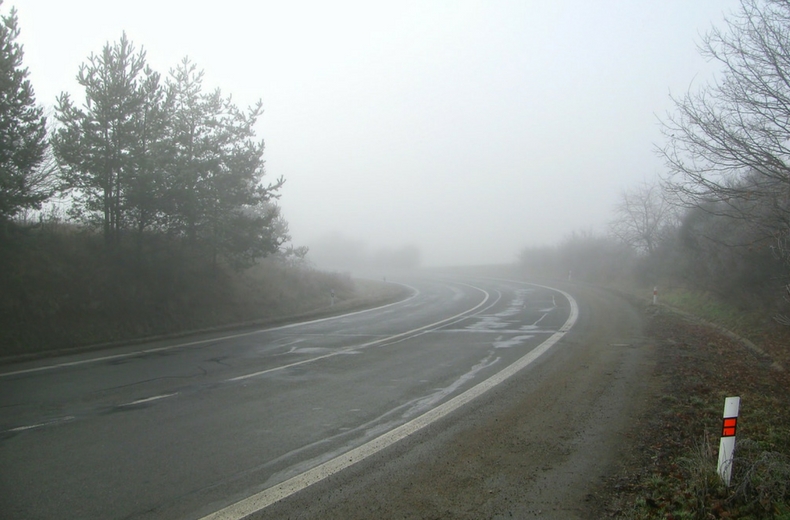
Fog lights should only be used in the fog, when visibility drops below 100 metres (328 feet) which is roughly the length of a football pitch, this is stated by the Highway Code (rule 226).
Not using your fog lights when appropriate could impact upon the safety of yourself and those around you when driving.
If while driving in fog your car is involved in an accident and you weren't using your fog lights, it could invalidate your car insurance.
Use your common sense. If the fog is so severe that you’re struggling to see other vehicles, switch on your fog lights. But don’t keep switching them off and on again, as this can confuse other drivers.
- RAC Temporary Car Insurance from 1 hour to 30 days
- RAC Learner Driver Insurance from 1 day to 5 months
- RAC Electric Car Insurance - learn more today
Can you be fined for having your fog lights on?
The Road Vehicles Lighting Regulations 1989 prohibits the use of front and rear fog lights to dazzle other drivers when visibility is not reduced or when the vehicle is parked.
Confusingly, using fog lights in drizzle and rain is therefore not allowed. You are even eligible for a fine from the police if caught.
Once the fog has lifted, switch off your fog lights.
There will be symbol on your car’s dashboard or on the fog light button itself: it’s normally an amber indicator for rear fog lights and a green one for front fog lights.
How can I check my lights and bulbs?
During the autumn/winter season when there is more chance of fog it is key to ensure your car is in the best running state to tackle the conditions before it, meaning it is highly advisable to check your lights are working before setting off:
Make sure you’re familiar with how to operate your front and rear fog lights before setting off, and don’t confuse these with your vehicle’s ‘full beam’ setting.
Daytime running lights and fog
If your car is fitted with automatic lights activated by low light levels, remember to check the lights are on, as they may not be automatically activated in foggy conditions.
Similarly, drivers whose vehicles have daytime running lights should ensure rear lights are switched on as most vehicles with this feature only illuminate the front lights.
Do all cars have to have fog lights?
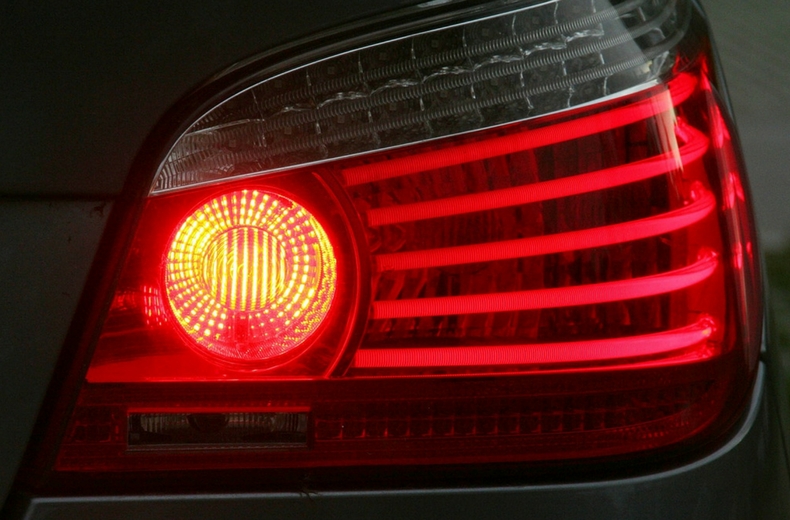
All cars must be fitted with rear fog lights as it’s a legal requirement.
If your car has been imported, it will need a rear fog light before it is allowed to be used on the road.
Front fog lights are not a legal requirement, but if your car has them you should only use them when visibility is severely restricted.
Make sure you have RAC breakdown cover, van breakdown cover or business breakdown cover too!
Get 30 driving tips that will save you money
Running a car isn’t cheap, but there are some easy things you can do to keep your costs down. Get these tips and more useful driving articles sent straight to your inbox now.



